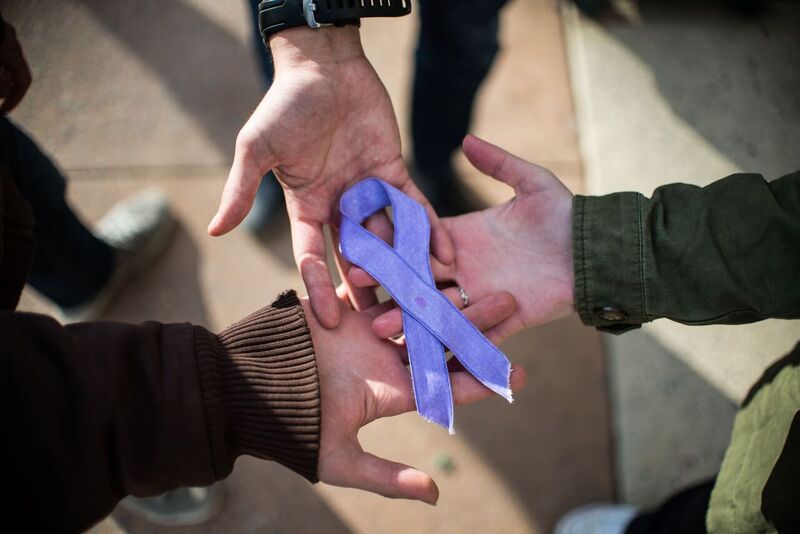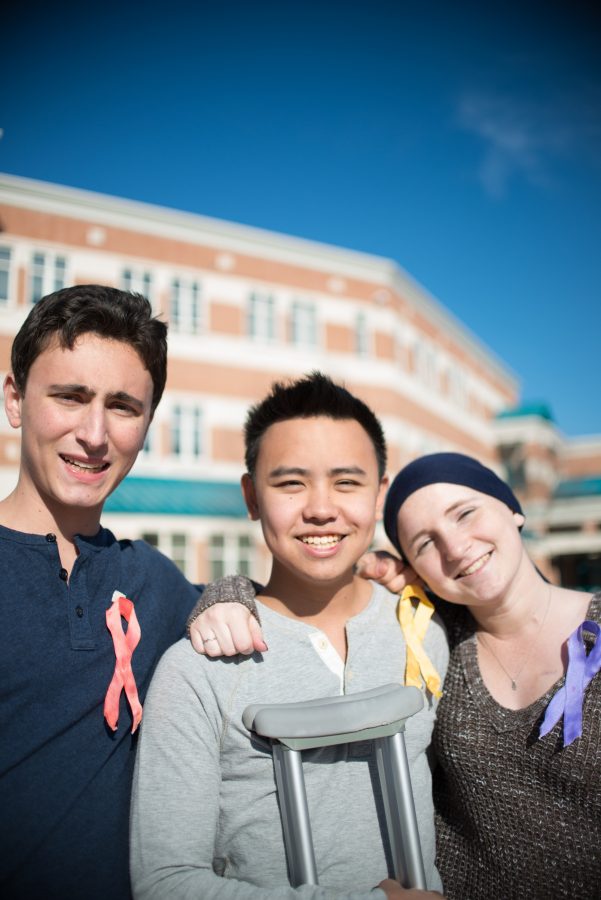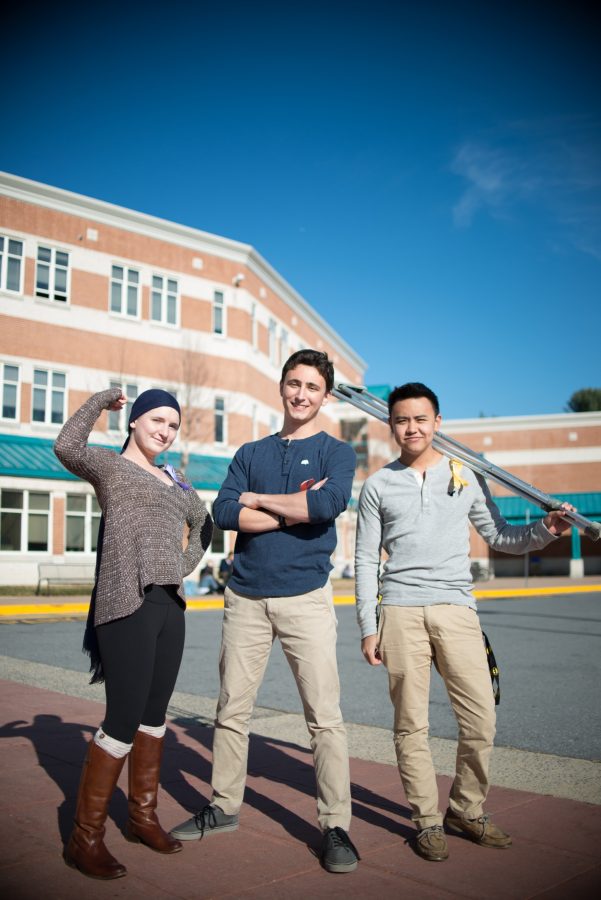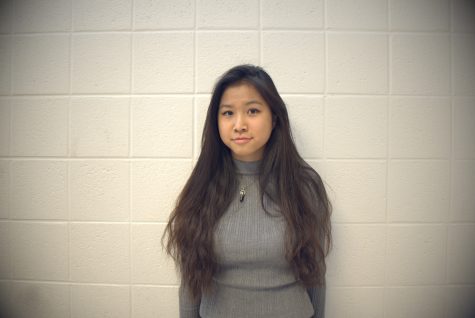Battling Cancer: Three students share journeys
January 6, 2017
I sat face-to-face with three students and asked them questions about their cancer stories; I think it’s safe to say I was an emotional mess during each conversation. At times I smiled; at times I couldn’t look them in the eye; at times I wanted to cry. Cancer narratives often oversimplify the patient’s battle to the journey of a hero who defies one-in-a-million odds and overcomes the impossible. And while these three students are nothing short of fearless survivors, there’s so much more to tell, like their Chipotle cravings or their newfound expertise in hematology.
These are their stories. This is what it feels like to have cancer.
Junior Olivia Matthews
Juniors Matthew Simon and Olivia Matthews and senior Jaiwen Hsu have different color ribbons that represent the different types of cancer they had. Photo by Tomas Castro.
Hearing the diagnosis is like a slap to the face; it takes a moment to process, and the aftermath is perplexing and painful. When Matthews was diagnosed June 2016 with Hodgkin’s lymphoma, even though she was sitting in an oncology clinic for cancer patients, the revelation was still jarring, she noted. Hodgkin’s lymphoma is an immune system cancer that compromises the body’s ability to fight infections.
“It was shocking and also scary,” Matthews said. “The first hour was very emotional because it was me and my parents coming to terms with what we had just heard. At this point there’s thoughts running through your mind like, what if it’s really bad?”
On the first day of treatment, doctors administer an entire dose of chemotherapy. The patient’s immune system flushes out the medicine for the next four to 10 days, which causes intense nausea.
“They gave me very powerful anti-nausea drugs the first time I had chemo,” Matthews said. “I actually spent three days in the hospital from getting admitted to the ER overnight because I just couldn’t stop being sick.”
Chemotherapy lowers both white and red blood cell counts, taking a harsh physical toll on the body. It left Matthews feeling physically drained. Prior to having cancer, she was a strong athlete and loved playing sports, but the chemotherapy rendered her unable to play tennis or swim.
“There was actually one point where I was so badly in need of a blood transfusion that when I was trying to make myself breakfast, I almost passed out trying to get a waffle from the toaster,” Matthews said. “So then I called my brother and made him get it for me.”
The strenuous mental battle with chemotherapy can be overlooked because chemotherapy has such a clear physical impact, but it exists: Matthews described her anticipatory dread before getting chemotherapy.
“You know in an hour you’re going to feel really poorly,” Matthews said. “So it’s hard to go in there and be like ‘alright, it’s fine’ because you know it’s not really fine.”
In the earlier stages of her treatment, Matthews was still getting used to her hair loss; she would sit in the waiting room wearing a scarf tied around her head, feeling sick and self-conscious. But one day, as she sat down and prepared herself for the next dose of chemotherapy, a little boy, who was also a cancer patient, walked past and cheered her up.
“I was just on my phone waiting to be called, and this little kid in a stroller comes in with his friends and he just looks at me and goes, ‘she’s pretty’,” Matthews recounted. “It was a little thing, but this was the first time I had gone there after I lost my hair, and I looked sick and here’s this little kid just freely voicing his opinion. It made me really re-think things.”
It was incredibly important to have friends and family by her side, Matthews said. When she was feeling tired and couldn’t move, they provided a welcome distraction.
“I was pretty much on the couch every day, but [my friends] Jonah and Hope were really helpful,” Matthews said. “They would get me whatever I needed, and if I was having trouble with anything, they would talk me through it.”
Even though people who go through this experience might look or seem different, they’re still the same person.
— junior Olivia MatthewsIt was hard for junior Hope Hilsenrath to watch her close friend going through cancer, but she tried to be there for Matthews, she said.
“It was hard on her body, but she is the strongest person I know,” Hilsenrath said. “She never even complained.”
Along with growing closer to her friends and family, Matthews has also learned not to make unwarranted assumptions or judge others. At the beginning of the school year, people around Matthews didn’t know she had cancer, and they would ask her why she wasn’t around.
So she made it very clear to her friends to treat her the same way, she said, because enough had changed already.
“You never know what people have going on, so don’t assume anything,” Matthews said. “Even though people who go through this experience might look or seem different, they’re still the same person.”
And she’s still keeping her head up. Matthews finished chemotherapy in September and completed radiation therapy in early November.
“Yes, you’re going through an awful situation that no one should have to go through, but there are upsides to it,” Matthews said. “You meet amazing people and you come out with a better perspective. If you keep that in mind while going through it, it makes it easier.”
Senior Jaiwen Hsu
Hsu was 11 years old when he was diagnosed with osteosarcoma, an aggressive bone cancer.
“The diagnosis brought a lot of confusion as opposed to fear,” Hsu said. “You know, being 11, I really didn’t know what it meant to have cancer. I knew it was serious, but I really didn’t know what to expect.”
Hsu’s cancer treatments, including chemotherapy and prescription medications, caused a range of taxing symptoms. Hsu spent time in and out of the hospital for about a year and had a total of 39 rounds of chemo as well as a surgery. He was often unable to eat, sleep or even watch TV.
“I was usually too sick to move,” Hsu said. “Physically, it felt like a combination of having poison needled into you while being hit with a freight train from multiple sides.”
But Hsu discovered little things along the way that have helped him remain positive, despite the situation.
“Believe it or not, I developed a craving for Chipotle that really powered me through hard days,” Hsu said.
It’s made me notice the things that people often take for granted.
— senior Jaiwen HsuAnd even though he was angry at first, after many treatments, Hsu gained a mature perspective, turning his resentment into gratitude.
“It’s made me notice the things that people often take for granted,” Hsu said. “If one of my friends spilled something, I would be less likely to get angry. I try to advocate that to the people around me. That we shouldn’t sweat the small stuff.”
Junior Matthew Simon
The first signs of cancer Simon noticed were swollen lymph nodes, which looked like enlarged bumps on the body. But his pediatrician didn’t diagnose his symptoms correctly, and he found out—one day before the first day of his sophomore year—that it was actually T-cell leukemia. And after that, it took a couple weeks for it to sink in, he said.
“It was pretty scary because the doctors said if I had gone to school the next day, I could have had a stroke in class,” he said.
At one point after his diagnosis, Simon thought he was having an actual stroke in school, displaying symptoms of a swollen tongue, difficulty writing with a pen and only being able to smile with one side of his face. But it turned out not to be an actual stroke—just a very rare side effect.
To complete his sophomore year, Simon met with principal Alan Goodwin every day after school to discuss his schedule and catch up with schoolwork.
“He handled it very well,” Goodwin said. “He appreciated our support, and he’s very strong. He had to put up with a lot and kept pushing himself through it.”
Simon lost about 22 pounds from his treatments, which caused a range of symptoms, including temporary diabetes from one medication.
It’s tough to talk about the experience, Simon said, because he’s tried to forget about a lot of it. But he’s found that it’s easier to manage with humor. He joked about the terrible hospital food, which he said made Whitman’s cafeteria seem like a five-star restaurant.
“When you have to go through such an awful situation, you kind of have to joke about it to get through it,” Simon said. “So that’s what I do.”
Simon also explained the science of blood loss associated with chemotherapy. With fewer white blood cells available, the body is left more susceptible to diseases; with fewer red blood cells available, patients experience dizziness and fatigue. From all his visits to the hospital, he’s become quite the expert in hematology, Simon noted.
You feel like you’re different from everyone else, you have to go to the hospital and have little time to be with friends, and you can’t be part of any clubs or sports
— junior Matthew SimonWhile having to endure an exhausting physical battle, he’s also had to face emotional difficulties that were less visible but just as severe. At first, he felt anger and even jealousy.
“I felt jealous of everybody else because they all got to live their lives,” Simon said. “But I had to, and still have to, be very health-conscious. It’s also very worrisome because you never know what can happen; you have to be worried if the medicine is working.”
Cancer also imposed isolating social restrictions on him, Simon said.
“You feel like you’re different from everyone else, you have to go to the hospital and have little time to be with friends, and you can’t be part of any clubs or sports,” he said. “I had to take a year off from crew.”
But going through a battle with cancer has made him wise beyond his years; he’s experienced more than most people his age, he said. Fighting cancer has taught him to be more appreciative of things he previously never noticed and he’s been inspired by other cancer patients.
“A lot of the little kids at the hospital had much worse situations than I did, but they were still able to be happy,” Simon said. “They were really cute, playing with their little toys and riding around in little cars, even though they were attached to an IV pole. That was both extremely depressing but also very inspiring.”
Even strangers have provided motivation for him in tough times.
“I saw this one guy walk in, and he was completely jacked, with really curly hair,” Simon said. “He sat down, and they stuck a needle in his arm, and I realized he was a patient there. So that made me feel better because it showed me if that guy can look better after going through cancer, I could too.”
Although these accounts are reported as accurately as possible, the cancer experience can’t be replicated through words; it’s something a person can’t understand when put simply.
As Matthews, Hsu and Simon sat down to speak about their experiences, there was one thing they all noted that I found incredibly powerful: they said they were lucky.
“I was lucky that most of my treatment happened over the summer,” Matthews said.
“I was actually lucky to have enough energy to go to school; many people with cancer can’t do that,” Simon said.
“I realized that there were kids going through situations much worse than mine,” Hsu said. “I was lucky, and the cancer had made me stronger.”




Patricia Fels • Jan 12, 2017 at 3:57 pm
These stories were well written and very interesting. I’m impressed that your interviewees opened up to you as much as they did. Nice job, Pearl Sun!
Thank you. • Jan 9, 2017 at 8:24 pm
You guys should post more stuff like this, this actually made me cry. Thanks.
Abigail Gorman • Jan 8, 2017 at 10:27 pm
A touching piece, thank you.